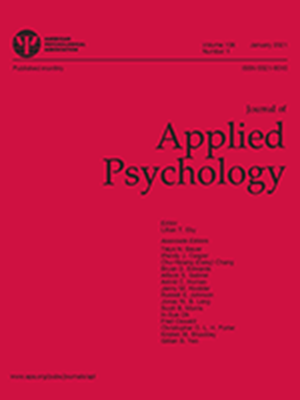When voice takes destructive rather than constructive forms in manager-employee dyads: A power-dependence perspective.
IF 6.1
1区 心理学
Q1 MANAGEMENT
引用次数: 0
Abstract
We offer a relational perspective on how power shapes voice in the employee-manager dyad. We argue that to properly understand the impact of employees' power on voice, it must be analyzed alongside the power held by their managers. We propose that although voice increases when employees hold high power, its form-whether constructive or destructive-depends on their managers' power. We posit that employees' dependence on managers for rewards and sponsorship reflects the power that managers hold over employees, while managers' reliance on employees for expertise and knowledge signifies the power that employees hold over managers. We argue that when employees' power increases in the context of high managerial power, they are more likely to develop interdependent and contextualized self-evaluations, such as organization-based self-esteem. These self-evaluations promote a constructive voice that involves challenging the status quo in a functional and actionable manner. Conversely, when employees' power increases in the context of low managerial power, they may develop independent and inflated self-evaluations, such as ego inflation. This can lead to destructive voice that involves merely expressing negativity as a way of questioning the status quo. We find support for our theory through a complementary set of studies, including a preregistered experimental study and a two-wave multisource field study. We discuss the implications of our findings for theory and practice. (PsycInfo Database Record (c) 2025 APA, all rights reserved).当声音在管理者与员工的关系中呈现出破坏性而非建设性的形式时:权力依赖视角。
我们提供了一个关系的视角,关于权力如何塑造员工-经理二元关系中的声音。我们认为,要正确理解员工权力对话语权的影响,必须将其与管理者掌握的权力一起分析。我们提出,虽然当员工拥有高权力时,声音会增加,但其形式——无论是建设性的还是破坏性的——取决于管理者的权力。我们假设员工对管理者的奖励和赞助的依赖反映了管理者对员工的权力,而管理者对员工的专业知识和知识的依赖则表明员工对管理者的权力。我们认为,在高管理权力的背景下,当员工的权力增加时,他们更有可能发展出相互依赖和情境化的自我评估,如基于组织的自尊。这些自我评价促进了一种建设性的声音,包括以一种功能和可操作的方式挑战现状。相反,在低管理权力的背景下,当员工的权力增加时,他们可能会产生独立的、膨胀的自我评价,如自我膨胀。这可能导致破坏性的声音,包括仅仅表达消极作为质疑现状的一种方式。我们通过一系列补充性的研究,包括一项预注册实验研究和一项双波多源实地研究,找到了对我们理论的支持。我们讨论了我们的发现对理论和实践的影响。(PsycInfo Database Record (c) 2025 APA,版权所有)。
本文章由计算机程序翻译,如有差异,请以英文原文为准。
求助全文
约1分钟内获得全文
求助全文
来源期刊

Journal of Applied Psychology
Multiple-
CiteScore
17.60
自引率
6.10%
发文量
175
期刊介绍:
The Journal of Applied Psychology® focuses on publishing original investigations that contribute new knowledge and understanding to fields of applied psychology (excluding clinical and applied experimental or human factors, which are better suited for other APA journals). The journal primarily considers empirical and theoretical investigations that enhance understanding of cognitive, motivational, affective, and behavioral psychological phenomena in work and organizational settings. These phenomena can occur at individual, group, organizational, or cultural levels, and in various work settings such as business, education, training, health, service, government, or military institutions. The journal welcomes submissions from both public and private sector organizations, for-profit or nonprofit. It publishes several types of articles, including:
1.Rigorously conducted empirical investigations that expand conceptual understanding (original investigations or meta-analyses).
2.Theory development articles and integrative conceptual reviews that synthesize literature and generate new theories on psychological phenomena to stimulate novel research.
3.Rigorously conducted qualitative research on phenomena that are challenging to capture with quantitative methods or require inductive theory building.
 求助内容:
求助内容: 应助结果提醒方式:
应助结果提醒方式:


